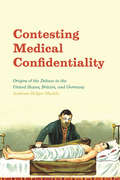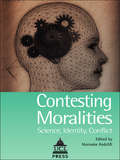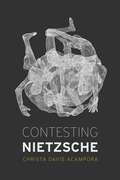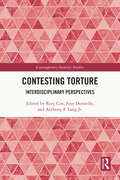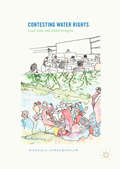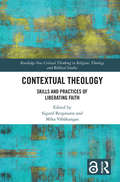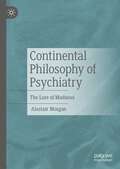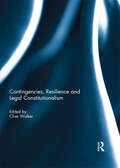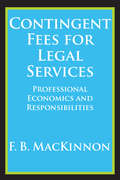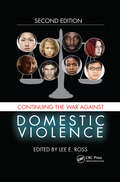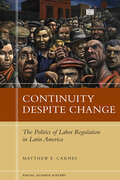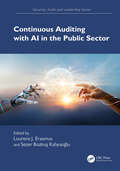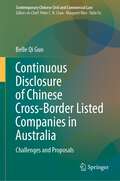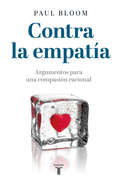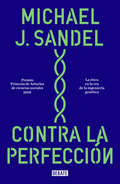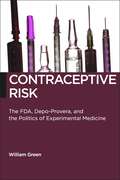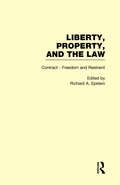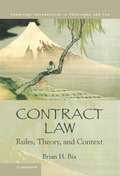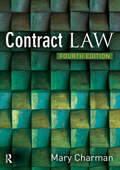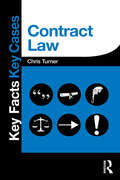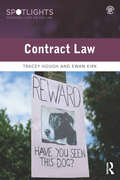- Table View
- List View
Contesting Medical Confidentiality: Origins of the Debate in the United States, Britain, and Germany
by Andreas-Holger MaehleMedical confidentiality is an essential cornerstone of effective public health systems, and for centuries societies have struggled to maintain the illusion of absolute privacy. In this age of health databases and increasing connectedness, however, the confidentiality of patient information is rapidly becoming a concern at the forefront of worldwide ethical and political debate. In Contesting Medical Confidentiality, Andreas-Holger Maehle travels back to the origins of this increasingly relevant issue. He offers the first comparative analysis of professional and public debates on medical confidentiality in the United States, Britain, and Germany during the late nineteenth and early twentieth centuries, when traditional medical secrecy first came under pressure from demands of disclosure in the name of public health. Maehle structures his study around three representative questions of the time that remain salient today: Do physicians have a privilege to refuse court orders to reveal confidential patient details? Is there a medical duty to report illegal procedures to the authorities? Should doctors breach confidentiality in order to prevent the spread of disease? Considering these debates through a unique historical perspective, Contesting Medical Confidentiality illuminates the ethical issues and potentially grave consequences that continue to stir up public debate.
Contesting Moralities: Science, Identity, Conflict
by Nannekke RedcliftQuestions of public and private morality, values and choices have become important areas of collective discussion. A key feature of this book is that it takes an ethnographic rather than a philosophical or speculative approach to moral debates. This study examines the contemporary explosion of ethical discourse in the public domain and the growing importance of moral rhetoric as an aspect of social relations.
Contesting Nietzsche
by Christa Davis AcamporaA brilliant exploration of a significant and understudied aspect of Nietzsche’s philosophy. In this groundbreaking work, Christa Davis Acampora offers a profound rethinking of Friedrich Nietzsche’s crucial notion of the agon. Analyzing an impressive array of primary and secondary sources and synthesizing decades of Nietzsche scholarship, she shows how the agon, or contest, organized core areas of Nietzsche’s philosophy, providing a new appreciation of the subtleties of his notorious views about power. By focusing so intensely on this particular guiding interest, she offers an exciting, original vantage from which to view this iconic thinker: Contesting Nietzsche. Though existence—viewed through the lens of Nietzsche’s agon—is fraught with struggle, Acampora illuminates what Nietzsche recognized as the agon’s generative benefits. It imbues the human experience with significance, meaning, and value. Analyzing Nietzsche’s elaborations of agonism—his remarks on types of contests, qualities of contestants, and the conditions in which either may thrive or deteriorate—she demonstrates how much the agon shaped his philosophical projects and critical assessments of others. The agon led him from one set of concerns to the next, from aesthetics to metaphysics to ethics to psychology, via Homer, Socrates, Saint Paul, and Wagner. In showing how one obsession catalyzed so many diverse interests, Contesting Nietzsche sheds fundamentally new light on some of this philosopher’s most difficult and paradoxical ideas.
Contesting Torture: Interdisciplinary Perspectives (Contemporary Security Studies)
by Anthony F. Lang Jr. Faye Donnelly Rory CoxThis edited volume seeks to contest prevailing assumptions about torture and to consider why, despite its illegality, torture continues to be widely employed and misrepresented. The resurgence of torture and public justifications of it led to the central questions that this inter-disciplinary volume seeks to address: How is it possible for torture to be practiced when it is legally prohibited? What kinds of moves do agents make that render torture palatable? Why do so many ignore the evidence that torture is ineffective as an intelligence-gathering technique? Who are the victims of torture? The various contributors in the book look to history, the practices of interrogators, artistic representations, documentary films, rendition policies, political campaigns, diplomatic discourses, international legal rules, refugee practices, and cultural representations of death and the body to illuminate how torture becomes permissible. Building from the personal to the communal, and from the practical to the conceptual, the volume reflects the multivalence of torture itself. This framework enables readers at all levels better appreciate how and why torture is open to so many interpretations and applications. This book will be of much interest to students of International Relations, Security Studies, Terrorism Studies, Ethics, and International Legal Studies.
Contesting Water Rights: Local, State, And Global Struggles
by Mangala SubramaniamAs globalization processes and related neoliberal agendas promote privatization through state action, people’s struggles for rights to water have intensified. In this context, this book examines the role of the ambivalent state in local struggles for water, which are deeply intertwined with global forums that support and/or challenge the privatization of water resources. These local-global struggles have redefined the relationships between the state, corporations, and other social actors that impact the local politics of inequality and marginalization.
Contextual Subjects
by Robert LeckeyLaw and legal discourse both presuppose and produce legal subjects. Views on the nature of the legal subject will constantly shift, therefore, with changes in the law. Contextual Subjects argues that a new view of the legal subject has indeed emerged and that it is now embedded in the social context and relationships. This claim is developed through a contrast of Canadian family law and administrative law as it was in the mid-twentieth century and as it is today.Robert Leckey argues that it is not only the subject that is contextual. Legal discourse and adjudication have also become more contextual, making family law and administrative law themselves contextual subjects. Leckey bolsters this argument through the use of relational theory, a rich strand of feminist political theory that advocates a contextual method and seeks to promote constructive relationships that enable relational autonomy. Developments in family law and administrative law, therefore, exemplify the contextualism called for by relational theorists. Leckey points to the importance of contextualization, but he is not uncritical of relational theory, insisting that it should articulate more forcefully its normative vision of good relationships and offer clear recommendations in contested areas.Contextual Subjects is the most thorough and sustained application of relational theory to legal examples to appear to date. It is unique in Canadian legal scholarship for the way it pairs family law and administrative law, and within legal scholarship in English for its integration of common law and civil law.
Contextual Theology: Skills and Practices of Liberating Faith (Routledge New Critical Thinking in Religion, Theology and Biblical Studies)
by Sigurd Bergmann Mika VähäkangasThis book advances that history by exploring stories, images and discourses across a worldwide range of geographical, cultural and confessional contexts. Its twelve authors not only enrich our understanding of the significance of the contextual method, but also produce a new range of original ways of doing theology in contemporary situations. The authors discuss some prioritised thematic perspectives with an emphasis on liberating paths, and expand the ongoing discussion on the methodology of theology into new areas. Themes such as interreligious plurality, global capitalism, ecumenical liberation theology, eco-anxiety and the anthropocene, postcolonialism, gender, neo-pentecostalism, world theology, and reconciliation are examined in situated depth. Additionally, voices from Indigenous lands, Latin America, Asia, Africa, Australia, and Europe and North America enter into a dialogue on what it means to contextualise theology in an increasingly globalised and ever-changing world. Such a comprehensive discussion of new ways of thinking about and doing contextual theology will be of great use to scholars in Theology, Religious Studies, Cultural Studies, Political Science, Gender Studies, Environmental Humanities, and Global Studies.
Continental Philosophy of Psychiatry: The Lure of Madness
by Alastair MorganThis book explores how the continental philosophical tradition in the 20th century attempted to understand madness as madness. It traces the paradoxical endeavour of reason attempting to understand madness without dissolving the inherent strangeness and otherness of madness. It provides a comprehensive overview of the contributions of phenomenology, critical theory, psychoanalysis, post-structuralism and anti-psychiatry to continental philosophy and psychiatry. The book outlines an intellectual tradition of psychiatry that is both fascinated by and withdraws from madness. Madness is a lure for philosophy in two senses; as both trap and provocation. It is a trap because this philosophical tradition constructs an otherness of madness so profound, that it condemns madness to silence. However, the idea of madness as another world is also a fertile provocation because it respects the non-identity of madness to reason. The book concludes with some critical reflections on the role of madness in contemporary philosophical thought.
Contingencies, Resilience and Legal Constitutionalism
by Clive WalkerContingency planning and resilience are of prime importance to the late modern risk society, with implications for law and for governance arrangements. Our risk society continues to seek ever more complex and detailed risk mitigation responses by law, including the UK’s Civil Contingencies Act 2004 and the US Homeland Security Act 2002, which respond to counter-terrorism, natural catastrophes, and other risks. This book seeks to analyse and criticise the legal developments in contingencies and resilience on a comparative basis, which engages with not only law and constitutionalism but also political theory and policy, including relations between public and private, national and local, and civil and military. Two transcending themes are of interest. One is institutional or structural – what bodies and power relations should we establish in a late modern world where Critical National Infrastructure is mainly held in private hands? The second is dynamic and concerns the grant of powers and arrangements for live responses. Both aspects are subjected to a strong critical stance based in 'constitutionalism', which demands state legitimacy even in extreme situations by the observance of legality, effectiveness, accountability, and individual rights. This book was originally published as a special issue of the International Journal of Human Rights.
Contingent Fees for Legal Services: Professional Economics and Responsibilities
by F.B. MacKinnonThe practice of contingent fees - taking a percentage share of the money recovered for damage or injury - began among lawyers as a method of providing legal services for those unable to afford counsel. It is now the dominant method of financing litigation for both rich and poor. F. B. MacKinnon, in this book, examines the ethical and economic questions within the legal profession or ethical theory in general."Contingent Fees for Legal Services" is a thoroughly documented study undertaken by the American Bar Foundation, the research affiliate of the American Bar Association. It provides the information necessary for evaluating the present status of this controversial practice and the proposals for its change. Arguments about contingent fees center around possible abuses in litigation, extreme competition for cases, increased emphasis upon winning cases, and other ethical considerations. This book describes fully the historical, professional and economic context within which contingent fees developed, without attempting to resolve the debates. In addition, the MacKinnon offers in one volume relevant court decisions, statutes and administrative regulations, estimates the proportion of cases presented under contingent fee contracts, and describes fee schedules and practices.As it permits an objective assessment of the fairness of contingent fees both to clients and to lawyers, this book will therefore interest everyone concerned with reforms of the fee system - lawyers and judges, professors and students, plaintiffs and defendants, as well as policymakers. This is an issue that continues to irritate and confound all concerned with the costs as well as rights of the legal profession and its clients.
Continuing the War Against Domestic Violence
by Lee E. RossProviding a comprehensive overview of domestic violence across all racial/ethnic groups, this book explores topics rarely discussed in other domestic violence texts and identifies barriers that discourage victims from reporting abuse. It presents varied perspectives from both academics and professionals, outlines prosecution and defense strategies, and supplies a balanced critique of mandatory arrest policies. This new edition has been fully revised and includes new topics that explore religion and domestic violence and problems that are encountered when a victim seeks police help.
Continuity Despite Change: The Politics of Labor Regulation in Latin America
by Matthew E. CarnesAs the dust settles on nearly three decades of economic reform in Latin America, one of the most fundamental economic policy areas has changed far less than expected: labor regulation. To date, Latin America's labor laws remain both rigidly protective and remarkably diverse. Continuity Despite Change develops a new theoretical framework for understanding labor laws and their change through time, beginning by conceptualizing labor laws as comprehensive systems or "regimes." In this context, Matthew Carnes demonstrates that the reform measures introduced in the 1980s and 1990s have only marginally modified the labor laws from decades earlier. To explain this continuity, he argues that labor law development is constrained by long-term economic conditions and labor market institutions. He points specifically to two key factors—the distribution of worker skill levels and the organizational capacity of workers. Carnes presents cross-national statistical evidence from the eighteen major Latin American economies to show that the theory holds for the decades from the 1980s to the 2000s, a period in which many countries grappled with proposed changes to their labor laws. He then offers theoretically grounded narratives to explain the different labor law configurations and reform paths of Chile, Peru, and Argentina. His findings push for a rethinking of the impact of globalization on labor regulation, as economic and political institutions governing labor have proven to be more resilient than earlier studies have suggested.
Continuous Auditing with AI in the Public Sector (ISSN)
by Sezer Bozkuş Kahyaoğlu Lourens J. ErasmusThe effectiveness of internal audit activities is important for the sustainability of change in the public sector. In this sense, the tools and techniques used and the level of competencies of public sector auditors are decisive. This book deals with the effects of current technological developments in the public sector on auditing and risk management activities. Therefore, it is a resource for public internal auditors to create a digital audit strategy based on artificial intelligence (AI) and blockchain-based applications. Institutionalisation of their structures is important for public sector internal auditors. For this, basic requirements, future expectations, and best practices are explained. The digital business model is presented to produce value-added audit findings and outputs that guide public internal auditors and all digital-era stakeholders. This book is a pioneering work based on continuous auditing/continuous monitoring approaches using various AI and blockchain-based tools and techniques.There is nothing more valuable to the success of a public internal auditor than a detailed understanding of the business. The important lesson in developing business knowledge, especially in the new audit universe emerging with digital transformation, is that all auditors must understand that they never finish learning about business processes, risks, and control points in the digital era.They must constantly push themselves to be motivated and learn about the business operations they audit to implement new audit approaches powered by AI. In addition to obtaining up-to-date business information from process owners and stakeholders, public auditors responsible for conducting an AI-based continuous audit programme should also look inside their departments for a different perspective on business information that impacts continuous audit programme phase details and has the potential to add value. It should be noted that the additional source of information begins with your individual audit experience, digital skills, and qualifications.
Continuous Disclosure of Chinese Cross-Border Listed Companies in Australia: Challenges and Proposals (Contemporary Chinese Civil and Commercial Law)
by Belle Qi GuoThis book studies an overarching question of the challenges faced by Chinese lawmakers, Chinese listed companies, Chinese companies’ external advisers, and securities regulators in dealing with Chinese cross-border listed companies’ continuous disclosure in Australia, and how can these challenges be addressed. Chinese listed companies are struggling to meet the continuous disclosure requirements while listing in Australia and have even been depicted as having poor corporate governance and transparency. Many get delisted from the securities market in Australia subsequently due to non-compliance in continuous disclosure or are straight rejected from listing because of continuous disclosure compliance concerns. This book cuts in from this angle and delves deep into the overarching question through the following four sub-questions: What are the theories and policies behind the continuous disclosure regimes in Australia and China and how have they been differently implemented in the securities markets in these two countries? What are the deficiencies, at the intracompany level, contributing to Chinese cross-border listed companies’ non-compliant continuous disclosure in Australia? What are the limitations, from the perspective of external advisers’ efforts, contributing to Chinese cross-border listed companies’ non-compliant continuous disclosure in Australia? What are the difficulties, at the regulatory level, contributing to Chinese cross-border listed companies’ non-compliant continuous disclosure in Australia? In addressing these questions and putting forward corresponding reform proposals, this book takes not only legal but also historical, cultural, and political-economic factors into consideration.
Continuous Sedation at the End of Life
by Sigrid Sterckx Sigrid Sterckx Kasper Raus Freddy Mortier Kasper RausContinuous sedation until death (sometimes referred to as terminal sedation or palliative sedation) is an increasingly common practice in end-of-life care. However, it raises numerous medical, ethical, emotional and legal concerns, such as the reducing or removing of consciousness (and thus potentially causing 'subjective death'), the withholding of artificial nutrition and hydration, the proportionality of the sedation to the symptoms, its adequacy in actually relieving symptoms rather than simply giving onlookers the impression that the patient is undergoing a painless 'natural' death, and the perception that it may be functionally equivalent to euthanasia. This book brings together contributions from clinicians, ethicists, lawyers and social scientists, and discusses guidelines as well as clinical, emotional and legal aspects of the practice. The chapters shine a critical spotlight on areas of concern and on the validity of the justifications given for the practice, including in particular the doctrine of double effect.
Contra la empatía: Argumentos para una compasión racional
by Paul BloomEn un mundo dividido, la empatía no es la solución: es el problema. Es habitual que pensemos que nuestra capacidad de experimentar el sufrimiento de los otros es una especie de fuente de nuestra bondad; sin embargo, no hay nada más equivocado. Paul Bloom, maestro de la universidad de Yale, revela que la empatía es uno de los principales motores de la inequidad y la inmoralidad en la sociedad. Lejos de ayudarnos a mejorar nuestras relaciones, la empatía es una emoción caprichosa e irracional que apela a nuestros propios prejuicios e, irónicamente, nos lleva con frecuencia a la crueldad. Bloom, basando sus argumentos en investigaciones científicas, ejemplifica que algunas de las peores decisiones tomadas por individuos y naciones -a quién dar dinero, cómo responder al cambio climático, a quién meter en prisión- son impulsadas normalmente por honestas, aunque desviadas, emociones. Con precisión y sabiduría, Contra la empatía evidencia cómo ésta distorsiona todos los aspectos de nuestra vida, desde la filantropía y la caridad, hasta el sistema de justicia; desde la sanidad y la educación, hasta la paternidad y el matrimonio. Sin empatía, insiste Bloom, nuestras decisiones serían más claras, más justas y, sí, más morales. La crítica ha dicho.. #Levante la mano quién de ustedes está en contra de la empatía# ¿Nadie? Paul Bloom admite libremente que estar en contra de ella es lo que la mayoría de las personas debería elegir. El autor argumenta por qué un análisis racional, moral y compasivo son mejores elementos para hacer del mundo un lugar mejor [#]. Para aquellos que deseen entender mejor cómo el corazón y la cabeza batallan por la supremacía y cuál es el órgano que debería regirnos, este libro es un acercamiento contraintuitivo que, además de ser delicioso de leer, es informativo.# Adrian Liang, Amazon Book Review #Refrescante.# Library Journal #Provocador# y poderoso.# Publishers Weekly #Un intrigante contraataque hacia el moderno cinismo psicológico.# Kirkus #Bloom desafía una de nuestras suposiciones más asumidas de qué significa ser bueno. Con humor y elegancia, Bloom revela la debilidad y la falsedad de este supuesto, y nos da una nueva visión de moralidad basada en cómo nuestra mente trabaja.# Carl Zimmer, autor de Evolution: Making Sense of Life #El análisis de Bloom es penetrante, comprensivo y actual. Contra la empatía está destinado a convertirse en un clásico de la psicología.# Michael Shermer, editor de la revista Skeptic, columnista en Scientific American y autor de The Science of Good and Evil.
Contra la perfección: La ética en la era de la ingeniería genética
by Michael J. Sandel¿Qué tiene de malo manipular nuestra naturaleza o la de otros seres? El filósofo Michael Sandel trata de responder a esta pregunta a través de un ameno pero profundo repaso del campo de la bioética. Desde hace tiempo es evidente que la ciencia va más deprisa de lo que nuestras intuiciones morales son capaces de asumir: hoy ya es materialmente posible encargar una mascota exactamente igual que la que acabamos de enterrar; o reivindicar que se asegure que nuestros hijos tendrán las mismas determinaciones genéticas que nosotros, incluso cuando consisten en algo como la sordera. La mayoría de las personas se sienten cuando menos incómodas ante algunas de las posibilidades que abre la ingeniería genética, aunque no siempre les resulta fácil explicar por qué. ¿Qué tiene de malo manipular nuestra naturaleza? ¿Dónde están las líneas rojas, si las hay?Contra la perfección explora estos y otros dilemas morales relacionados con la búsqueda de nuestro propio perfeccionamiento. Sandel argumenta que la búsqueda de la perfección es imperfecta por razones que van más allá de la seguridad y de la equidad, y nos lleva más allá de los familiares términos del discurso político para mostrarnos que la revolución genética transformará el modo en que se discute sobre cuestiones éticas y obligará a reintroducir las cuestiones de orden espiritual en el centro del debate político. Para debatir sobre la ética del perfeccionamiento es preciso abordar preguntas que el mundo moderno ha ignorado desde hace décadas, en gran medida porque bordean el terreno tradicional de la teología. Pero nuestros nuevos poderes en el ámbito de la biotecnología hacen inevitables estas preguntas. Abordarlas es la tarea de este libro, escrito por uno de los filósofos políticos más notables de nuestro tiempo.
Contraceptive Risk: The FDA, Depo-Provera, and the Politics of Experimental Medicine (Biopolitics #12)
by William GreenThe story of Depo-Provera joins the national struggle over the drug's FDA approval to the state legal issues raised by its contraceptive and criminal justice uses.Depo-Provera is known as an injectable hormonal birth control method, but few are familiar with its dark and complicated history. Depo-Provera was tested on women since the mid-1960s without their informed consent until it was FDA-approved in 1992, but never FDA-approved as chemical castration for male sex offenders.Contraceptive Risk is William Green's landmark study of Depo-Provera. Based on a fascinating combination of archival materials and interviews, the book is framed as three interconnected stories told by Judith Weisz, who chaired the FDA's Public Board of Inquiry on Depo-Provera, a scientific court; by Anne MacMurdo who brought a products liability suit against Upjohn, the drug's manufacturer, for the deleterious side effects she suffered from the drug's use; and by Roger Gauntlett, an Upjohn heir who, when he was convicted of sexual assault, refused to take a dose of his family's own medicine as a probation condition. Together these three stories of Depo-Provera's convoluted fifty year odyssey call for a paradigm shift in pharmaceutical drug development.Contraceptive Risk is a thoroughly researched and engrossing approach to the scientific, political and institutional forces involved in health law and policy, as well as the multifaceted politics of measuring risk.
Contract - Freedom and Restraint: Liberty, Property, and the Law (Liberty, Property, And The Law Ser. #Vol. 4)
by Richard A. EpsteinFirst Published in 2000. Routledge is an imprint of Taylor & Francis, an informa company.
Contract Drafting
by Paul A. SwegleContract Drafting and Negotiation for Entrepreneurs and Business Professionals
Contract Law
by Brian H. BixTo gain a deep understanding of contract law, one needs to master not only the rules and principles of the field, but also its underlying theory and justification, and its long and intricate history. This book offers an accessible introduction to all aspects of American contract law, useful to both first-year law students and advanced contract scholars. The book is grounded on up-to-date scholarship and contains detailed references to cases, statutes, Restatements and international legal principles. The book takes the reader from contract formation through interpretation and remedies, considering both the practical and theoretical aspects throughout. Each chapter also includes helpful lists of suggested further reading.
Contract Law
by Mary CharmanThis textbook covers the Contract Law option of the new A-level law syllabus, and provides at the same time an ideal introduction for anybody coming to the subject for the first time.The book covers all A-level syllabuses/specification requirements, and is written by the principal examiner in Contract Law for one of the major examination boards. It contains extensive case illustration, and a range of examination related questions and activities. There is a special focus on key skills, and on the new synoptic assessment syllabus requirements.This fully updated fourth edition builds upon the success of the first three editions, with new case law (especially on offer and acceptance, legal intent, terms, exemption clauses and misrepresentation remedies) and coverage of new statute law (especially Unfair Terms in Consumer Contracts Regulations).
Contract Law
by Neil AndrewsSignificantly streamlined and updated, the second edition of Andrews' Contract Law now provides a clear and succinct examination of all of the topics in the contract law curriculum. Chapters direct students to the most important decisions in case law and employ a two-level structure to integrate short judicial excerpts into detailed discussion and analysis. Exploration of the law's 'loose ends' strengthens students' ability to effectively analyse case law, and new end-of-chapter questions, which focus on both core aspects of the law and interesting legal loopholes, assist students in preparing for exams. Students are guided through chapter material by concise chapter overviews and a two-colour text design that highlights important chapter elements. Suggestions for further reading and a rich bibliography, which point readers to important pieces of contemporary literature and provide a springboard for deeper investigation of particular topics, lend further support for student learning.
Contract Law (Key Facts Key Cases)
by Chris TurnerKey Facts Key Cases: Contract Law will ensure you grasp the main concepts of your Contract Law module with ease. This book explains in concise and straightforward terms: The rules regarding formation of contracts The contents of a contract Vitiating factors, factors which invalidate an otherwise validly formed contract The rules on discharge of contractual obligations Available remedies Key Facts Key Cases is the essential series for anyone studying law at LLB, postgraduate and conversion courses and professional courses such as ILEX. The series provides the simplest and most effective way to absorb and retain all of the material essential for passing your exams. Each chapter includes: diagrams at the start of chapters to summarise key points structured headings and numbered points to allow for clear recall of the essential points charts and tables to break down more complex information Where relevant, chapters also contain a Key Cases section which provides the simplest and most effective way to absorb and memorise essential cases needed for exam success. Essential and leading cases are explained The style, layout and explanations are user friendly Cases are broken down into key components by use of a clear system of symbols for quick and easy visual recognition
Contract Law (Spotlights)
by Ewan Kirk Tracey HoughContract Law is an engaging and accessible new textbook aimed at students on core LLB and GDL courses. Combining comprehensive coverage of the curriculum with carefully developed pedagogical tools, the authors help students learn, gain an enhanced understanding of how the law works, and develop their ability to apply this newfound knowledge and understanding in assessment situations. To be successful in assessments, students must be able to analyse and solve legal problems, while accurately and appropriately applying legal authority. The Spotlights series models these core skills alongside a full and thorough exposition of the substantive law.
